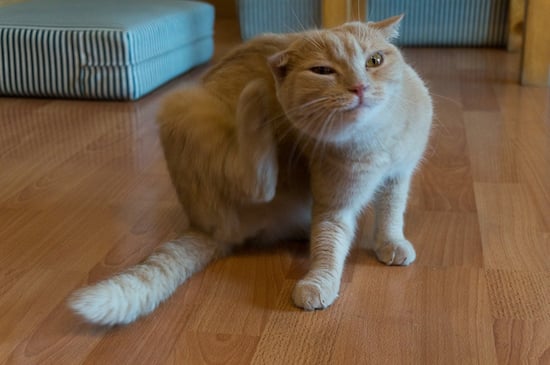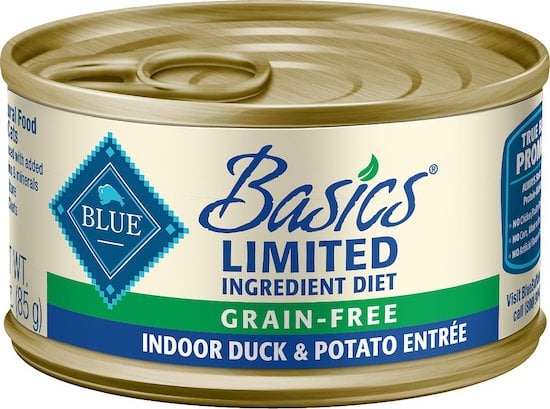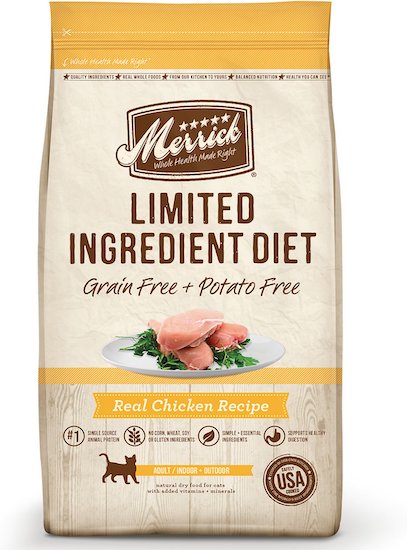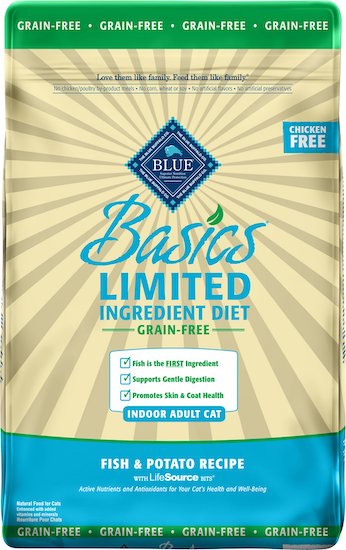Updated July 2, 2020 | For Cat People
By Karen Anderson
- This post contains affiliate links. Read more here.
- Not a substitute for professional veterinary help.
There are few things more frustrating than trying help your cat when they’re suffering from some sort of allergy. The cat is itching and scratching and obviously uncomfortable. Pretty soon you’re on a quest to find the best food for cats with allergies so your cat’s life—and yours—can go back to normal. But before you lug home several bags of new cat food, let’s talk a bit more about cat allergies.
What Causes Allergies in Cats?
According to a 2018 report from Banfield Pet Hospital, cats are vulnerable to three types of allergies: food, fleas, and environmental substances, such as pollen, dust, fabrics, cleaning solutions, and even cat litter. To complicate matters, some unfortunate cats may have multiple allergies at once.
Perhaps surprisingly, allergic reactions to fleas and to chemicals in the environment are on the rise, while allergies to food are stable—and relatively uncommon, affecting only about 0.1 percent of cats. The study, based on 500,000 cats seen at Banfield clinics in the previous year, concluded that “food allergies in our pets are uncommon, and other causes of certain skin conditions should be investigated before pursuing a food allergy diagnosis.”
Tracking down the source of your cat’s specific allergy can get tedious and expensive. To simplify, start with your vet. They can help you figure out exactly what is making your cat sick. (It may not even be an allergy. For example, bacterial or fungal infections can both cause skin irritation.) Once you know what’s causing the problem, you can get to work on your cat’s recovery.
Checking for a Food Sensitivity
While you’ll see tests for cat food allergies advertised, the Cummings Veterinary Center at Tufts states unequivocally that they don’t work. If your vet suspects your cat has a food allergy, they might ask you to switch completely to a special prescription diet, called a hypoallergenic diet, for up to three months. The hypoallergenic diet consists of cat food made up of hydrolyzed proteins—the proteins have been altered so the cat’s immune system can’t detect any allergenic components. If the allergy symptoms disappear in the hypoallergenic diet but return when the cat is given regular food—it’s pretty clear your cat has a food allergy. Your vet may ask you to go back and forth between the hypoallergenic diet and various limited-ingredient foods (see below) to try to figure out what protein was the culprit in the allergic reaction. Be patient—this can take months!
Food for Cats With Allergies
If your cat is found to have food allergies, you’ll likely be trying an elimination diet to figure out what foods are causing your cat’s distress. This is where a limited ingredient diet (LID) comes in.
While many popular cat foods mix in multiple types of protein and fats (chicken and fish oil, beef and chicken, etc.) LID foods usually contain only one type of animal protein. Sometimes the solo protein is a “novel protein”—a less-common cat food ingredient, such as venison, duck, alligator, or rabbit. The idea is that your cat has probably not eaten those proteins and is unlikely to have developed an allergy to them. Very often, limited-ingredient foods minimize the types of carbohydrates in their recipes as well. The carbohydrates might vary between wheat, corn, rice, and potatoes.
Testing different diets takes time, so be patient as you work toward the right solution for your cat.
We combed the market for hypoallergenic and limited ingredient diet foods for cats with food allergies, and came up with both dry and wet foods from several well-regarded brands. Note that for the hypoallergenic formulas, you’ll need to provide a prescription, or your veterinarian’s contact information, to purchase.
Venison is the unique animal protein in this dry food for cats with allergies and sensitivities. Natural Balance also offers a similar venison-based formula as canned wet food. As with other novel proteins, venison is a good alternative to meats that your cat may otherwise be reacting to.
If you want to move your cat away from potentially triggering proteins, this limited ingredient diet food is ideal for cats with allergies, offering a duck-and-potato alternative. It’s free of chicken, beef, dairy, eggs, grain, gluten, byproduct meals, corn, wheat, soy, artificial flavors, or preservatives.
Ready to focus your cat on a limited ingredient diet rich in chicken? This Merrick dry food formula comes in three sizes, including a smaller 4-pound bag that’s ideal for feeling out if your cat likes it. The recipe is grain-free and includes chickpeas as an easily digestible carbohydrate. The brand advises mixing this with their LID wet food chicken recipe.
This limited ingredient wet food for cats with allergies is built around turkey (from food-grade, free-range birds) and chicken liver. It can be served as a topper to FirstMate’s turkey formula dry food, or as a meal in itself. Available in 5.5-ounce or 12.2-ounce cans.
For cats who love the texture of pâté and need a limited-ingredient diet free of poultry, beef, and fish, this novel protein—farm-raised rabbit—could be the answer. This recipe is also made without dairy, eggs, grain, potato, corn, wheat, or soy. Available In 3-ounce and 5.5-ounce cans.
This fish-based formula from Canadian company Petcurean gets rave reviews on Chewy from cat parents who’ve been trying various foods for cats with sensitive stomachs. The option of buying a small (3 pound) bag makes it affordable to try.
This limited-ingredient, grain-free food is rich protein from fish, with easy-to-digest carbs from potatoes. It includes LifeSource Bits—the company’s combination of selected antioxidants, minerals, and vitamins necessary for feline health.
Your vet may prescribe this food for adult cats with skin and gastrointestinal sensitivities. In addition to easily digestible hydrolyzed soy proteins, it includes omega-3 fatty acids, B vitamins, and a blend of fibers.
The chicken proteins in this prescription diet food for cats with allergies are hydrolyzed to prevent your cat’s immune system from reacting to them. This formula contains the amino acids, minerals, and supplements required for your cat’s health.
Further Reading
Featured image via Deedee86/Pixabay
Karen Anderson is a writer at Rover. Before joining Rover, she was a writer and editor at Apple and a freelancer for companies including Cardiac Science, Houzz, the Home Owners Club, and the Seattle Times. Her hobbies are dancing, gardening, science fiction, and pet-sitting for friends and neighbors. She shares her house with a delightful clowder of quirky rescue cats.
The Dog People Newsletter
Sign up and get $25 off pet sitting and dog walking!









